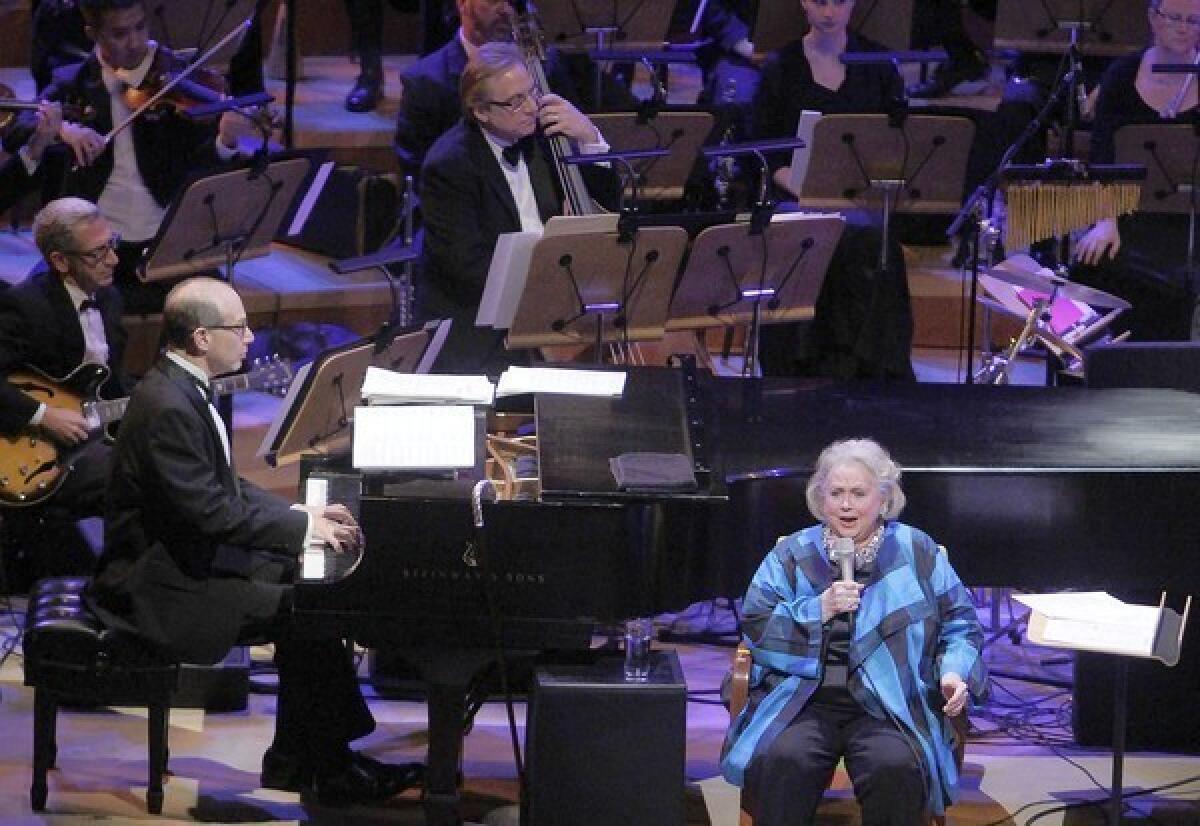Review: Barbara Cook rejuvenates song standards

- Share via
Legend has it that Juan Ponce de León set off for the New World in search of the Fountain of Youth. Five hundred years later, Barbara Cook, the ageless 85-year-old singer, can be credited with having found it — not in some secret Florida spring, but in the American songbook.
On Wednesday, Cook brought her rejuvenating magic to Walt Disney Concert Hall in a program with the Los Angeles Philharmonic that she characterized as “schizophrenic” and “eclectic.” But “enchanting” would be a more accurate description of a bill that blended musical theater standards with swing and allowed this Broadway baby to reconnect with her Southern roots.
The evening started with the overture from “Candide,” the operetta that put Cook on the map with the showstopping aria “Glitter and Be Gay.” Leonard Bernstein’s score, conducted by Rob Berman, established just the right ebullient mood.
Walking with a cane and forced to perform in a chair, Cook exuded the same radiance and “gee-whiz” charm of her younger Social Security years. Her soprano may not be as athletic as it once was, but it is every bit as expressive — maybe even more so.
The memory of my first encounter with this peerless interpreter of lyrics is one I’ll treasure forever. It was at New York’s Café Carlyle, and Cook stunned me with her handling of “Before the Parade Passes By,” the “Hello, Dolly!” song I had heard a hundred times before but never really heard at all. She sang this Jerry Herman number not from the standpoint of a matchmaking dynamo but from the perspective of a person who had been to the bottom and was determined to rise again before it’s too late.
That deep human understanding that draws us to great actors — the fellow feeling of a survivor — lit up her rendition of Stephen Sondheim’s achingly beautiful “No One Is Alone,” sung with the faith of someone who has doubted at moments whether there is anybody there.
The quick tempo established by Cook’s pianist and musical director Ted Rosenthal set up fears that the pace might diminish the poetry. But a resonant emotional through line soon clarified itself in the succession of early numbers that included “Let’s Fall in Love,” “It Might as Well Be Spring” and “A Wonderful Guy.” It was the spirit of a singer who appreciates more than ever the life-stirring sensation of romance. Time, rather than making her jaded about love, has intensified her delight in the wonder of two people coming together.
“Georgia on My Mind” aroused memories of her childhood in Atlanta. She conjured an image of a girl with her “face pressed to the glass of life” — a life, she says, she eventually found on stage in New York, which she still calls home.
A haunting a cappella version of “House of the Rising Sun” was seamlessly followed by “Bye, Bye Blackbird” — with Cook explaining the connection between the two songs having to do with houses of ill repute, one woman returning, another leaving and starting anew. This background was interesting, but her singing established a link that was even more meaningful.
“Funny how the time just flies” — this line from “Here’s to Life” had a special gravity coming from someone who’s already starting to plan her 90th birthday celebration. But Cook, who admitted to being something of a YouTube addict, isn’t mournfully looking back.
For an encore, she delivered a shattering interpretation of “Imagine,” sung without a microphone, to just piano accompaniment. It was a prayer for the future from an artist who feels the past and still wants more.
MORE
CRITIC’S PICKS: Fall Arts Preview
TIMELINE: John Cage’s Los Angeles
PHOTOS: Arts and culture in pictures
More to Read
The biggest entertainment stories
Get our big stories about Hollywood, film, television, music, arts, culture and more right in your inbox as soon as they publish.
You may occasionally receive promotional content from the Los Angeles Times.











